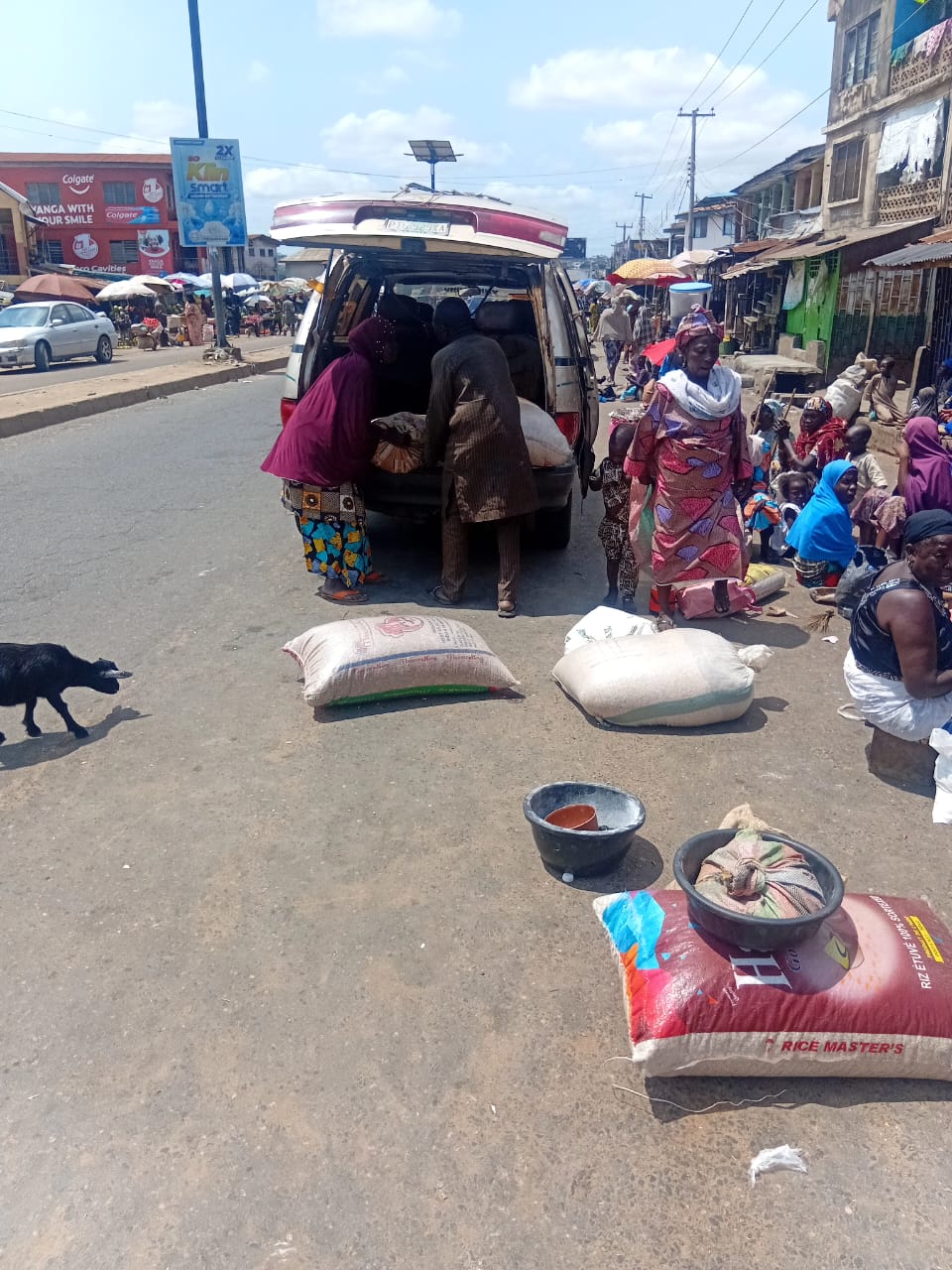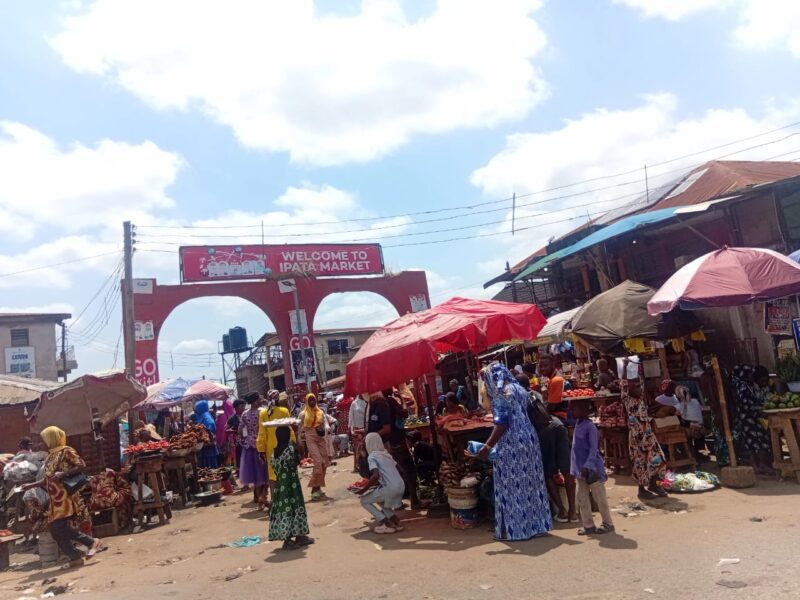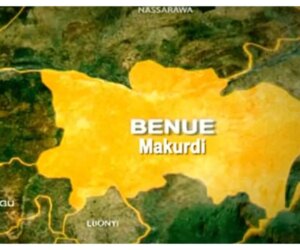Barely three minutes into its journey from Ilaro to Sango-Ota in Ogun State, a vehicle carrying fresh maize was stopped at a police checkpoint along the Ilaro-Papalanto road. It was in the first half of June, and the midday sun burnt the skin gently. The 2001 Sedan vehicle had no side mirrors, and the police officers, rifles slung over their shoulders, waved the driver aside. They exchanged a knowing smile. The driver knew the drill. Without argument, he slipped a folded N500 note into a waiting palm. The barrier was lifted, and the vehicle moved on toward Papalanto.
By the time the vehicle arrived in Sango-Ota, the driver had paid almost N4,000 in illegal fees and “tolls” at nearly a dozen checkpoints. From Ilaro through Papalanto, Ifo, Singer, Iyana-Ilogbo, Joju and Sango, “tolls” were paid in different amounts depending on the bargaining nature of the ‘toll collectors’.

“Sometimes it’s the police, sometimes soldiers or local government task forces and sometimes road safety officers,” the driver, Baba Igbesa, who had driven the route for over a decade, told PREMIUM TIMES.
“If you don’t pay, they delay or seize your vehicle. It’s even better here; it’s worse along Idiroko road because of the border route.”
Adijat Abolaji, a produce trader who owned the bags of maize and travelled alongside this reporter, told PREMIUM TIMES that those “invisible payments”, multiplied by thousands of trucks and vehicles carrying food items across Nigerian roads daily, form a hidden tax on every bag of rice, basket of tomato, tuber of yam, and bag of maize that reaches the market.
“People rarely talk about it, but that’s also a major reason why food prices are high,” she explained in Yoruba.
The toll that never ends
Extortion has become as predictable as potholes across Nigeria’s highways. From Kano to Lagos, Enugu to Port Harcourt, Ibadan to Ilorin, multiple truck drivers say they spend vast sums of money at checkpoints mounted by various security agencies.
Truck drivers, food produce off-takers and farmers lament that they are squeezed by a chain of illegal levies, multiple security checkpoints, and corrupt officials who demand “settlements” before agricultural produce can be transported to big markets and cities.
Experts say the ripple effect is a steady rise in the cost of transporting food and, ultimately, the retail price of foodstuffs in the market, a burden eventually borne by the final consumers.
Between April and August, PREMIUM TIMES travelled with some agro traders and food produce off-takers across Oyo, Osun, Kwara, Ogun, and Lagos States to document their plight and establish if road extortion affects the retail prices of food items.

At Ipata Market in Ilorin, the capital of Kwara State, Kawu Abdulrahman, a driver, lamented the high cost of transporting grains and other agricultural produce from the north through Jebba.
“We pay too much money to security agencies on the road and traders have no choice but to transfer the cost to consumers,” Mr Kawu, who has plied the roads from Ilorin to Niger State and parts of Kaduna for years, explained.

At Kulende and Mandate markets, both in the heart of the city, multiple traders told PREMIUM TIMES that the cost of transportation had risen sporadically as the security situation worsened along the northern corridors and security officials extorted truck drivers.
Meanwhile, along the road linking Zango and Kwara State Polytechnic, this newspaper observed that the Federal Road Safety Corps (FRSC) mounted a checkpoint and some wads of notes exchanged hands between the officers and many compliant bus drivers, tricycle and Okada riders.

The road, which leads to Kulende Market, connects Ilorin with a section of the northernmost part of the state considered Kwara’s food and agricultural hub. Many drivers, tricycles, and Okada riders who transport food produce to Ipata and other markets in the central part of Ilorin told this newspaper that they paid varying amounts in illegal tolls depending on the officers involved.
“If you don’t wear your helmet, and even if you carry foodstuff along that road, the FRSC officers will charge you at least N2,000 on the spot, unreceipted. Otherwise, you may be taken to their office and charged way higher, so our people prefer to pay,” said an Okada rider at Maraba Park junction who identified himself simply as Gani because of fear of victimisation.

“If your papers are complete and you wear a helmet, they will collect a small amount, like N200, from you. But that amount will also be factored into the transport cost for the trader you are delivering food items to in the central markets, and they will also push it to consumers.”
Mr Kawu said the amount paid is higher for vehicles carrying heavy agricultural produce.
The situation is not different in Osogbo, the capital of Osun State.
Earlier in May, when PREMIUM TIMES first visited the city via the Gbongan-Osogbo road, this newspaper observed that police officers collected bribes from an agric produce off-taker on two different occasions along the road, first at a checkpoint after Gbongan and later at Owode-Ede.

Later in June, when PREMIUM TIMES’ reporter posed as a co-traveller with another agricultural produce supplier and got to JerryPaul Roundabout in Osogbo, too many “officials” besieged the vehicle conveying bananas and other fruits, demanding sundry “papers” and threatening to delay the vehicle if they weren’t “settled.”
At the junction were officials of the Osun Internal Revenue Service (OIRS), those of the “Emission Control Scheme”, and some others who identified themselves as “EDL Marshal”, who claimed to be representatives of an organisation working to support and reform education and rehabilitate out-of-school children in the state.
The driver eventually “settled” the group with N1,000, unreceipted, and was allowed to move the agricultural produce past the junction.

“That’s what we experience every day here. The extortion is too much, and one has to factor them into the final prices for consumers,” Binta Oyedele, an agric produce off-taker, said.
Efforts to reach the Osun State Government on the officials’ conduct were unsuccessful.
Ms Oyedele explained that traders struggle to make a profit from their businesses due to the high cost of transport and logistics caused by highway extortion.

“If I buy agricultural produce of N30,000 and cough out almost the same amount to transport it from Iwo to Ibadan, how do I make a profit? So, the final consumer bears the brunt because fruits and food items I could have sold in units of N500 each will be pushed up to N1,000.”
Some kilometres from JerryPaul Roundabout, along the Ibadan-Iwo Road, another group of “officials” representing the “Emission Control Scheme” emerged, demanding bribes and threatening to stop the vehicle. An additional N1,000 was paid to the group, too.
“By the time we get to Bodija or Iwo Road, I would have paid more than N10,000 in illegal tolls, especially if it’s in the morning or evening when they (security officials) usually mount barricades and stand on the road,” the driver said.
Complicit drivers?
At the Bodija Market, Hassanah Ajisefini, an off-taker, lamented that the drivers of vehicles conveying agricultural produce from villages to cities are also complicit.
“Many drivers, too, are guilty as they don’t have the right vehicle documents. So, they need to pay bribes so security officials can look away,” Mrs Ajisefini, a pepper and tomatoes trader and off-taker at the market, told PREMIUM TIMES.
In Ilaro, PREMIUM TIMES observed that some drivers conveying food items fall prey to extortion schemes because their vehicles and trucks are sometimes in bad condition.

But Baba Igbesa, who had to pay regular bribes to police officers and some FRSC officials because his vehicle did not have a side mirror, explained why he did not fix the mirror.
“If you renew all your papers, you pay bribes; if you don’t renew, you pay… if your vehicle is in good condition, you pay; if not, you pay… so why bother yourself?” he said, with a tinge of sarcasm.
Northern Nigeria
In many parts of the north, the country’s food and agricultural hub, the situation is worse for drivers conveying food items to major southern markets such as Lagos, Onitsha, and Port Harcourt. Most drivers plying the north-south route who spoke with PREMIUM TIMES did so in frustration and fear for their safety.
Nura Ibrahim, a Kano-based truck driver frequently transporting grains to the south, said drivers set aside a huge amount of money for security agents at checkpoints.
“The security agents can delay your movements if you delay giving them the money. Some will deliberately ask you about your particulars and even threaten to offload the goods if you are not cooperative in giving them the money.
“They will say they suspect you are carrying illegal goods, adding, ‘Can you offload the goods so that we can investigate?’ As a driver, you are in trouble once you allow it to reach this level. If they intend to collect N1,000 from you, the charges will change to a bigger amount.
“I do budget like N30,000 to N40,000, depending on the checkpoints. If you give a small amount, they will ask you to park aside, and they won’t attend to you for a long period.”
He said that due to the perishable nature of some of their produce, they pay security officials “road money” for easy, quick passage, and the cost is ultimately transferred to the final consumer.
Another driver, Ibrahim Uba, said bribing security agents at checkpoints is a safety and security ritual, especially for many who travel for days and drive at night.
“Once you don’t give them, they will mark you. If you come back again, they will create a problem for you, and you must pay for the previous ones you defaulted on.
“I spend over N30,000 on the security checkpoints starting from the extortion by the Kano State Road Traffic Agency (KAROTA) manning the city traffic up to security forces on the main highway,” he said.
At Mile12 International Market in Lagos, Saliu Adamu, a pepper trader, told PREMIUM TIMES that highway toll could be as high as N100,000 or more for a truck conveying tomatoes and other perishable food items from places like Kano.
“When we factor that cost into the price of a basket of tomatoes, Lagosians will complain, but they don’t know what we go through on the road. If you remove highway extortion, food prices will moderate slightly downward,” Mr Adamu said.
Extortion meets inflation
The effect of these illegal payments ripples through the food value chain: transporters add them to freight charges; wholesalers transfer them to retailers; and retailers pass them on to consumers.
Nigeria’s headline inflation rate eased for a fifth straight month in August, helped by a slowdown in food inflation, according to official data from the National Bureau of Statistics (NBS). The decline to 20.12 per cent year on year from 21.8 per cent in July encouraged the Central Bank of Nigeria to cut the interest rates at its monetary policy meeting in September. Food inflation, a key driver of the headline rate, stood at 21.87 per cent year on year in August, compared with 22.74 per cent the month before, partly due to the change in the methodology.

Although the food inflation rate still raises concerns for many analysts, the government said the slowdown is a sign of better days compared to November 2024, when the food inflation rate stood at 39.93 per cent.
While the government often blames insecurity and high energy costs, food transporters and off-takers say corruption on highways is a critical but overlooked factor.
Nigerian farmers and off-takers already record losses and face challenges in insecurity, rising fertiliser prices, erratic weather that threatens yield, and post-harvest losses. But even getting produce to market remains a herculean task.
“We work hard to grow crops, but by the time the goods reach the city, transport and extortion have swallowed our profit,” a yam farmer in Makurdi, Gloria Adaji, told PREMIUM TIMES on the telephone. “Sometimes we leave produce to rot because it’s not worth the stress.”
According to experts, post-harvest loss in Nigeria ranges between five and 20 per cent for grains, 20 per cent for fish, and between 50 and 60 per cent for tubers, fruits, and vegetables.
Farmers and transporters told PREMIUM TIMES that extortion, though rarely captured in official figures, is one of the most corrosive factors driving losses.
Across highways in the country, PREMIUM TIMES observed that spoilage is common. Trucks carrying perishable items — tomatoes, vegetables, fruits — are delayed at checkpoints. By the time they arrive at their destination, part of the produce would have gone bad.
“You can lose 10 to 15 baskets of tomatoes in one trip if you are not careful,” a driver said.
Muted enforcement
In September, Kailani Muhammad, the chairman of a group called the “Harmony Corps of Nigeria,” said that the corps had received the Nigerian government’s mandate to flush out touts from the nation’s highways.
He said the move was designed to “check the collection of illegal taxes and levies on the highways” and promote cheap food items in the country.
“Our operations will cover from Abuja to Lokoja to the South-west, South-east, and South-south. From Abuja to Kaduna, Zaria, Kano, Maiduguri, and all over the country,” he said.
“We are already identifying all the checkpoints where these dubious people operate. We are going to bring out the blueprint as soon as possible. We are also establishing a control room to ensure that we track all the trucks leaving one state or the other to their destination.”
In telephone interviews with this newspaper, two drivers and produce off-takers likened the announcement to the usual promise by the various Inspectors-General of Police to dismantle illegal checkpoints.
“They remove the checkpoints during media coverage,” Morufu Bolajoko, a trader at the Mile 12 International Market, told PREMIUM TIMES. “After two weeks, the roadblocks are back again.”
The Nigerian police have repeatedly urged their personnel not to collect bribes. The police have sanctioned many police officers caught on camera collecting bribes in different Nigerian roads. However, the problem still persists.
READ ALSO: Africa imports close to $50 billion worth of food annually- official
From highway toll to hunger
The removal of fuel subsidies by President Bola Tinubu in May 2023 led to an increase in the transportation costs for agricultural produce, which some analysts believe fuelled inflation. Mr Tinubu said ending fuel subsidy and unifying the nation’s multiple exchange rates were painful but necessary for the country’s economic revival.
In the short term, the policies led to a rise in the prices of essential goods, including food items. Last year, mobs looted food warehouses and hijacked food trucks in parts of the country. Last December, dozens died as they scrambled to get free food at different charity events. Amid the melee, farmers and produce off-takers face enormous challenges and pay through their noses to transport food items across the country.
Bola Oyeleke, the national president of the Tomato and Orchard Producers Association of Nigeria (TOPAN), lamented the impact of highway extortion on traders and farmers who deal in perishables.
“Sometimes, they pay N5,000; it depends on the truck you carry,” Mr Oyeleke told PREMIUM TIMES in an interview.
Apart from illegal taxes across different local government areas, Mr Oyeleke said members of his association complain about the huge bribes paid to security agencies.
“Most of the trucks that carry our food are complaining. They pay up to N20,000 before getting to Lagos or more than N50,000 from Kano to Lagos,” he said.
“If you are going to Port Harcourt, you will pay more. That is why they have to increase the cost of transportation.”
Mr Oyeleke called on the government to take drastic measures to eradicate the extortion.
For now, the trucks keep moving, and so do the bribes. The cost is passed on to millions of Nigerians already struggling to eat.
This reporting was completed with the support of the Centre for Journalism Innovation and Development (CJID)










